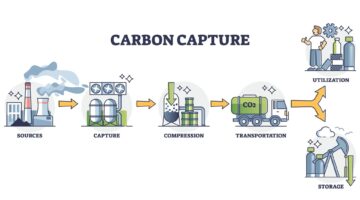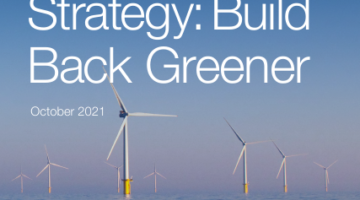
Here at the GreenAge we love renewable energy. There’s absolutely no doubt that it’s the way forward, not only for the UK but for the whole world.
That said, we think it’s important to understand how renewable energy works, and realise its limitations. Only then can we maximise its potential, and move forward with a cleaner energy system.
We’ve done a podcast on this topic, covering the intermittency issue as well as many other issues we’ll have to tackle. You can listen to it here, or scroll to the bottom of the article to watch it.
What is intermittency?
Without a doubt, the biggest problem with mainstream renewable energy is intermittency. Wind power is only generated when it’s windy, solar power is only generated when it’s sunny. This creates several fundamental issues.
We need some level of predictability with our energy generation, or we risk mass blackouts. On a windless day without any sun, we still need power.
At the opposite end of the spectrum, are the times when these forms of generation create more power than we’re able to handle. There are times at which the national grid, in its current state, cannot handle the energy we’re generating.
How does intermittency affect the grid?
So to understand how intermittency affects the grid, first we need to understand how the National Grid works.
The main problem is that in order to operate properly the National Grid has to work maintain a 50Hz frequency, and if it varies too much from that then there are big problems. It’s a demand and supply thing. If demand is up then supply needs to be high, if demand is low then we need to reduce the amount of energy going into the grid. That’s okay with controllable energy generation like gas, but is a problem for things like wind and solar.
Take, for example, wind turbines. If the wind is blowing like crazy but the demand is low, the frequency rises too high. If the demand is high but it’s a still day, the frequency of the grid falls too low and we begin to experience blackouts. These fluctuations caused by intermittency can, if not properly managed, can cause a lot of damage to the National Grid infrastructure, which would be extremely costly to repair.

How can we combat the problem of intermittency?
At the moment, we use subsidies like the above to prevent the grid overloading from intermittent sources at times of excess generation. We also rely on other, more easily controlled sources to work in tandem with our renewable energy generation. This can’t be a baseload plant like nuclear, it has to be something that we can turn on and off at short notice. In the UK, this is predominantly gas. One of the issues with renewable power is therefore that the more renewable infrastructure we build, the more gas (or similar) plants we have to construct in order to counter-balance.
So why don’t we put the extra energy into batteries? That would solve the intermittency issue, right? Well, theoretically yes, but the problem there is simple: technology simply isn’t there yet. We do have some battery storage, but nothing on the scale that we’d need. Developing new and better batteries will be the defining feature of 21st-century energy management. We need it, and we need it now.
Think we missed something? Do you have a different opinion?
Comment below to get your voice heard…












interesting article!! not something i’ve ever considered before!!
Excess generation doesn’t affect the FREQUENCY, it affects the POWER.
Also, you may wish to mention emerging technologies like GRAVITRICITY which aim to absorb excess power and release it during periods when demand exceeds supply.
That’s totally wrong. You need some very basic knowledge of the grid. When load decreases, generator ramps up and thus frequency goes up. And vice versa. Regarding GRAVITRICITY, theoretically, it works. But it never comes to a scale enough for wide adoption. It needs water and mountains or so to work, and some environmental issues with constructing those plants.
FAO Harriette
I believe that I have a solution regarding intermittency, one which I cannot believe has not been given serious considered before.
Having had time to research following heart surgery, as a retired scientist I have been hugely disappointed by the lack of development of FCEV’s compared to the considerable commitment by both BEV manufacturers and the government department for Business and Energy Industrial Strategy. (BEIS)
The former, I can understand. There is already a substantial developing market, from Tesla to Leaf, for the ‘quick-fix’ opportunism which readily available electricity makes immediately possible. However, regardless of the inherent problems of range and refuelling times, the expansion of the BEV market pays no regard to the increasing demand on the National Grid. As ‘second’ short range domestic vehicles I can see that BEV’s have a realistic place, though I find the government expenditure on increasing infrastructure beyond domestic supply, seriously worrying. (probably less than 30% of British homes have ‘on-drive’ parking for charging and even those that do may find difficulty in accommodating the charging of two or more cars). The increased queuing at public recharging stations, with the possible volume of BEV’s before 2050, does not bear thinking about.
With only one ‘under-canopy’ refuelling opportunity alongside current fuels (Beaconsfield service station on the M40), a few other ‘stand -alone’ supplies, (try finding them!) the potential for hydrogen powered FCEV’s seems hopeless. If the government funding initiatives were re-directed to providing a hydrogen refuelling infrastructure, having studied maps of Britain I believe that about 150 strategically placed refuelling stations would provide an attractive workable solution. As demand grows, more stations in towns and cities could be extended alongside, and ultimately replacing, current fuel pumps, using the Beaconsfield model at existing refuelling stations.
Now for the important and most ‘elegant’ enabling proposal. The ‘Intermittency’ issue regarding wind power (and solar) potentially provides the solution to our electricity supply requirements with several attractive additional advantages:
1) We are one of the ‘windiest’ countries in Europe with a high central spine and the mostly reliable surrounding on-shore /off-shore wind potential for generating more additional electricity supply.
2) Given a considerable investment to increase the number of wind turbines with the PRIMARY PURPOSE of dissociating water using electrolysis to produce hydrogen, that same supply could be switched virtually instantaneously to supplement our proven fragile National Grid.
3) The double bonus of this commitment would enable the ultimate benefit of ‘flat-lining’ our full use of electricity supply and demand. Rather than selling cheap-rate night time electricity generated by thermal power stations, this currently under-used supply could be fully utilised by diverting it to produce and supplement the supply of hydrogen.
4) Should we achieve the goal of excess supply of hydrogen, it could be used to supplement our natural gas imports by up to 20%.
Unlike excess electricity, surplus hydrogen could be stored in historic mines.
While a grid or ‘highway ‘of hydrogen may be futuristic, it is no more so than roads, canals, railways, current gas supply and the national grid which have historically met our supply and distribution needs. Reducing costs of supply may also be achieved by on or near-site clusters of turbines where possible, for production of hydrogen at the point of end use..
While I am aware that battery charge times and efficiencies are constantly in development, particularly with the use of silicon anodes, so are more efficient technologies regarding hydrogen production using high temperatures and the use of polymer electrolyte membranes (PEM’s), The fact that the end-use of hydrogen is currently more expensive than electricity, the long term practicality, advantages and disadvantages, should be given balanced consideration. Electricity is still predominantly produced using fossil fuels. Hydrogen provides a zero carbon option which cannot be overlooked. We should not be swayed by the arrogant assertion of Leon Musk that “Fuel cells are incredibly dumb” and “mind bogglingly stupid” This is as short sighted as Einstein saying in 1932, “At no way in the future can I see the development or realisation of a nuclear weapon” or Bill Gates being once reportedly saying “640Kb is more memory than anyone will ever need on a personal computer.”
We are on the threshold of a ‘step change’ which will determine our carbon free future and we need to get the balance right. I for one would not wish to extend my 6 hour (min.) journey to my daughter in Scotland by more than another hour for the privilege of driving a Tesla, not least when I can see the considerable inherent advantages of the arguments for FCEV’s above.
I can provide source references from my research if required.
Hydrogen fuel cells are already absurdly expensive as it is because they use rare, valuable metals like palladium. They are great for niche high performance applications that can afford them. But whatever fixes energy storage on the grid has outperform and be far cheaper than anything we currently have on offer. As it is fuel cells cannot compete with ordinary batteries on any scale whatsoever. And ordinary batteries of any kind are currently woefully inadequate to make intermittent power practical.
It is actually not the wind turbines that increase the frequency, it is the “base load generators’. The inverters used by the wind turbines, respective the comparably low rotational masses per turbine, if in direct feeding mode, do barely influence the frequency or even rather stabilise the frequency. Whilst the direct coupled generators with huge rotational masses start spinning up and the initial stabilising generator starts speeding up due to the low load situation, thus increasing the frequency. Although the frequency increase itself is an stabilisation element in itself as the increased frequency increases the power draw of inductive loads in the grid.
In an electric circuit you can only feed in what is taken out and vice versa. The increased frequency increases the (inductive) load and therefore compensates for the higher input. The other element is the voltage in the circuit. Again, a higher voltage increases the load and therefore compensates, or rather used to.
The more direct driven loads are replaced with more efficient electronically controlled loads the less relevant become these stabilisation elements and rather become a problem. Solar and wind (with limitations) are fed into the grid by inverters who use the frequency of the network and adjust and stabilise the frequency and the power factor.
We have huge storage capacities installed in this country, which are mainly untapped and rather made obsolete by unattractive tariffs. In households more than 70% of the energy is used to create heat. Why would we want to convert the electrical energy into chemical energy and back to electric energy to finally convert into heat with huge losses, when we can easily convert into heat straight away with near no losses at all and store this heat? Many households have storage cylinders of which most have direct heating elements. They would gladly take this excess energy and store it for a reasonable price. This would reduce the overall energy use as currently we discard or burn this energy and then have to still generate that energy just in time when it is needed. That is what really increases the bills for the households.
Let us be honest, there is no economical need and want for the traditional energy generators, storage is a cost and storage removes the urge that does drive energy prices and margins up. If you run a business, would you voluntarily cut the peak demand that fills your pockets? Storage on the consumer side does actually have an economic (and ecologic) need.
But I see these storages removed left, right and centre because people cannot afford to run those systems because of ridiculous unit prices. Only people with private generation are benefiting from private storage currently. My previous supplier (one of the big old dogs in the business) asks nowadays for higher prices for the off peak than I would have paid at the competition for an all day tariff. At the same time I was locked in via a complex metering system and could not go elsewhere and take an actual cheaper tariff. At the same time their system would have allowed them to remote control the feed to my storage, which would have enabled them to make proper use of the system and establish loads at low demand times and remove those at peak times. Instead they forced all my neighbours with similar systems into tariffs where the storage loads are switched _on_ during peak demand times. And for more than a year they did that to me too until I spent a lot of time and money to get out.
I am inclined to say, the problems are not related to the establishment of renewable energy. Quite the opposite as smooth running networks in areas with lots of renewables and wonky networks with lots of power cuts in areas with lacking renewables do hint.
And storage is not as big a problem as always said, we would just need to use the existing storage.
We are light years away from having too much energy but not much closer to sensible management of our existing resources.
Intermittency is no longer a problem, period. Hydrogen Electrolysis to store energy whilst network requires less energy, and then using hydrogen to deal with network peak. Of course the engineering for this system is a technical balancing act, but hydrogen can be converted to electricity with milisecond response times on 2MW scale. Yes its very expensive to do, but no more expensive than the current costs for sizewell C (costs for which are still increasing regularly). We need to make clear that intermittency is no longer a problem and that ‘cost’ of power should not be the driver for future power provision/the global emergency needs more expensive technologies to be implimented now – not when the price comes down (which they will).
Yes intermittency is still a problem because there is no power grid of even moderate size on planet earth that has successfully gotten around it by producing most of their energy with it.
Stop denying reality. The hard truth is that if you REALLY want to stop fossil fuels the solution you have on offer (which France and Sweden have opted for decades ago) is nuclear.
I say this respectfully as a physicist and environmentalist who appreciates your candor and realism.
Battery tech is not there yet as you pointed out. The only solutions we have on offer for replacing fossil fuels are what Sweden and France switched to durimg the 70’s and continue to use effortlessly keeping down their greenhouse emissions. Nuclear (and some hydro for Sweden). Some places get away with a geothermal in parts of Northern Europe.
Solar and wind are not yet viable. When they get there we can use them. But until then we have to go with the only proven solution that is on offer.
modern nuclear plants can alter their power output in a few minutes.. perfectly useable as counterbalance